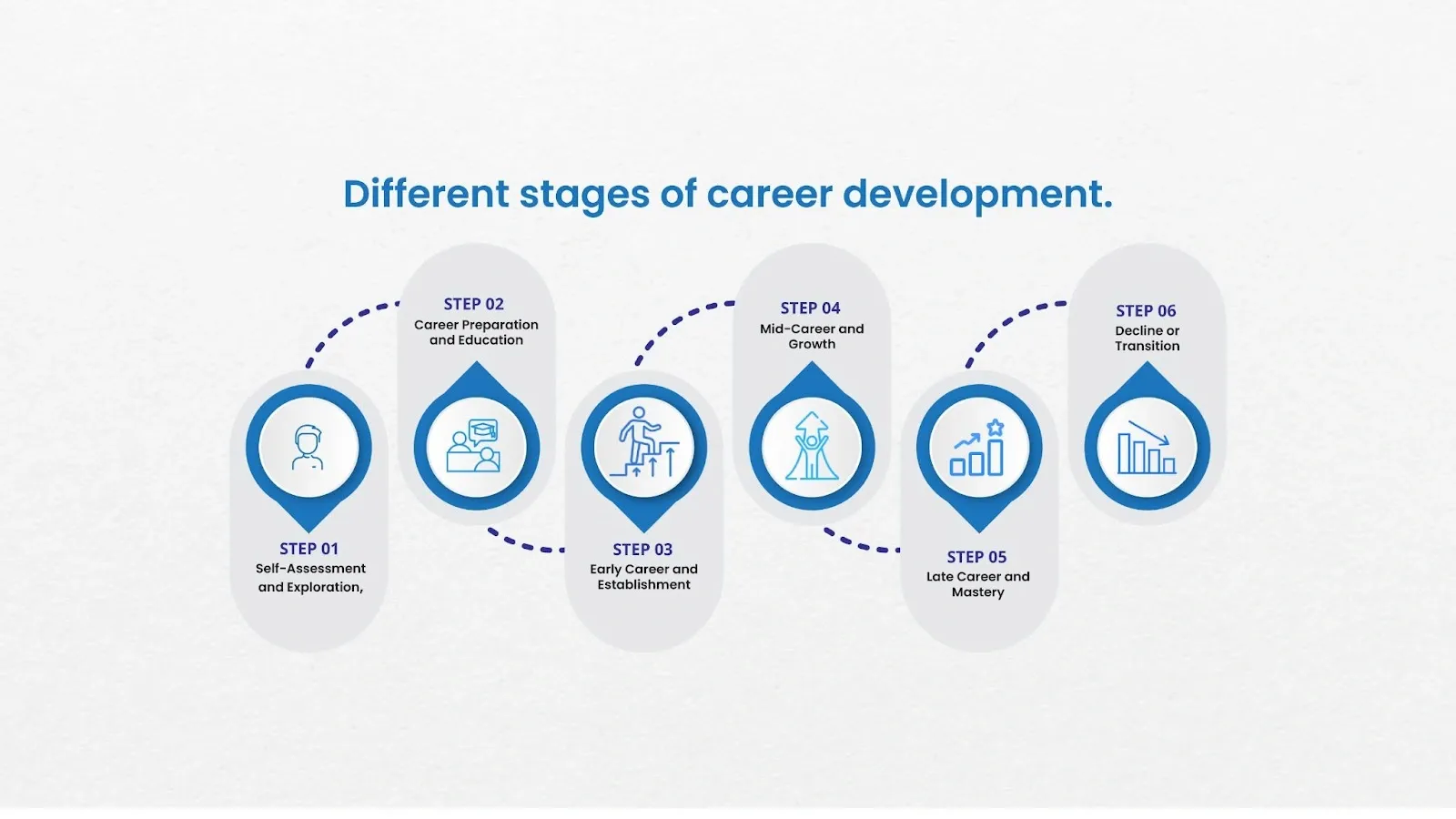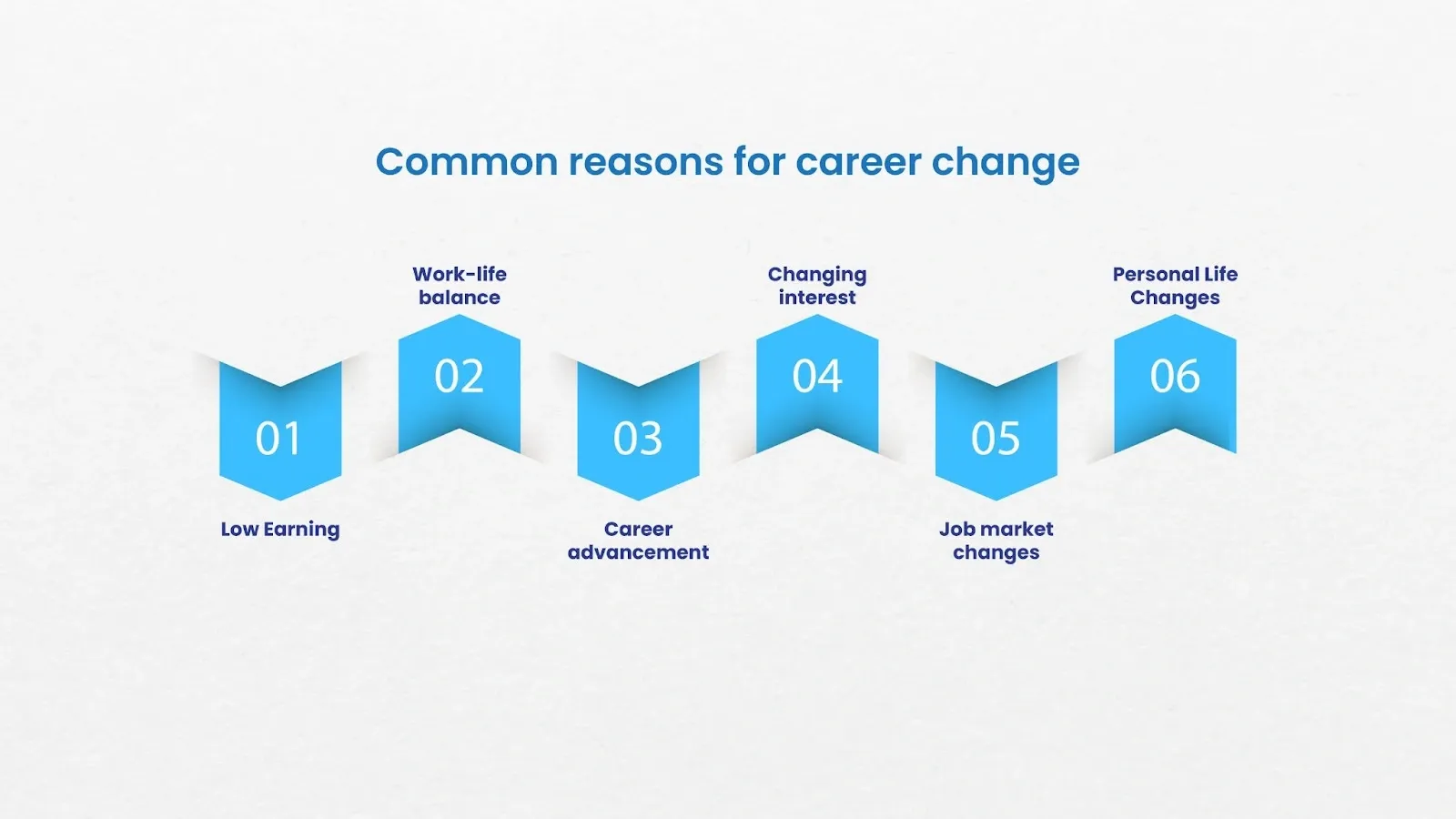How to Manage Your Career and Make Career Changes

Career change is a headache for many. Choosing a career path and setting goals takes a serious time commitment and a lot of hard work. But even with all that effort, people often decide to change careers. To understand why people switch gears, we need to take a closer look at what career change and career management are all about.

Around 60% of adults have switched their careers. This shows how much people are willing to change their careers.
Career change is a subset of career management. Career management encompasses the broader notion of managing one's professional trajectory, while career change specifically refers to transitioning from one occupational field or specialization to another.
The driving force behind a career change is a crucial factor in its execution. Individuals may opt for a career shift due to a newfound skill or interest, or they may seek a change to escape the drudgery of their current position. The reasons for pursuing a career change are multifaceted and will be explored further in this blog.
Before delving into the nitty-gritty of career management, let's explore why it's an indispensable tool in today's ever-evolving work landscape. Here are some compelling reasons:
- It empowers individuals to stay relevant and competitive in a vibrant job market.
- It fosters the setting and attainment of long-term goals for sustained growth and advancement.
- It encourages continuous learning and skill development for personal and professional progress.
- It aligns career trajectories with unique interests and values for enhanced fulfillment.
Understanding Career Management
Career management is an ongoing process of planning and strategizing to achieve long-term career goals. It involves self-assessment, career exploration, and continuous learning to enhance professional and personal growth. Effective career management requires thoroughly understanding one's interests, skills, and aspirations.
Proactively seeking new opportunities is crucial for career advancement. By staying abreast of market trends and exploring potential paths, individuals can identify and pursue promising opportunities that align with their career aspirations. Career management also equips individuals with the adaptability to thrive in dynamic work environments, ensuring professional sustainability and growth.
Career management is a comprehensive concept encompassing various aspects of professional development. Understanding these facets is essential for successful career navigation. Let's delve deeper into the significance of career management.
Importance of Career Management
- Career Progression: Effective career management enables individuals to progress in their careers. Individuals can advance to higher positions, gain more responsibility, and achieve professional growth by planning and working toward their career plans.
- Job Satisfaction: When individuals manage their careers actively, they are more likely to find jobs that fit their skills and interests, leading to higher job satisfaction. This satisfaction is crucial for long-term career success and personal well-being.
- Adaptability: Career management fosters adaptability. In an ever-evolving job market, being adaptable to change is vital. Career management helps individuals anticipate changes and be prepared to pivot or shift directions.
- Networking: It also involves building and maintaining professional networks. Networking can open doors to new opportunities and provide support and guidance throughout one's career.
- Personal Branding: Career management helps in developing a personal brand. This includes how individuals present themselves in their professional circles and can significantly impact their career opportunities and reputation.
- Financial Stability: Individuals can ensure steady career progression by effectively managing their careers, which often translates into economic stability and growth.
These factors collectively contribute to career advancement and growth. It's crucial to distinguish between career development and career management. Career management involves establishing objectives, creating career plans, and implementing strategies to achieve them. In contrast, career development refers to the progression of one's professional journey.
Therefore, comprehending career management necessitates understanding career development's intricacies and its distinct phases.
Different Stages of Career Development

- Self-Assessment and Exploration: This initial stage involves self-discovery, where individuals assess their interests, values, skills, and personality traits. It involves exploring various career options, conducting informational interviews, and engaging in self-assessment tools or career aptitude tests.
- Career Preparation and Education: This stage involves acquiring the necessary education and skills for a chosen career path. It involves pursuing relevant academic or vocational training, internships, entry-level jobs, and developing essential workplace skills.
- Early Career and Establishment: This stage involves the initial years in the workforce, where individuals start to apply their skills and education. It consists of gaining practical experience, understanding workplace dynamics, building professional networks, and establishing a reputation in the field.
- Mid-Career and Growth: This stage is marked by further development and advancement in one's career. It seeks advanced roles, further skill development, possibly changing career paths, and enhancing professional relationships.
- Late Career and Mastery: This stage is characterized by having substantial experience and expertise in the field. It involves serving in leadership or mentorship roles, refining expertise, and possibly planning for retirement.
- Decline or Transition: This final stage involves winding down one's professional life. It involves reducing work hours, transitioning into retirement, or shifting to less demanding roles.
All these stages require a different set of skills and qualities to achieve career goals. So, it is essential to know what those requirements are. So, let’s dive into some crucial skills and qualities for successful career management.
Essential Skills and Qualities for Successful Career Management
- Problem-Solving Skills: The ability to identify challenges and develop practical solutions.
- Communication Skills: Strong verbal and written communication abilities for clear and compelling interactions.
- Adaptability and Flexibility: Adjusting to new challenges and changing career landscapes.
- Continuous Learning: Commit to ongoing skill development and staying updated with industry trends.
- Networking Skills: Building and maintaining professional relationships that can aid career growth.
- Decision-Making Abilities: Effectively weighing options and making informed career decisions.
- Time Management: Efficiently managing time to balance career development with other life aspects.
Career Goals and its Importance

In today's fast-paced job market, establishing clear career goals is more crucial than ever. These goals serve as a compass, guiding your professional journey with direction and purpose. With well-defined objectives, your career path aligns more closely with your broader aspirations, ensuring that every step is meaningful and intentional.
Specific goals help you maintain motivation and direction in your work. In essence, setting career goals isn't just a professional task; it's a strategy for ensuring your career path is as rewarding and fulfilling as possible. It's about making conscious choices and taking deliberate actions toward a future that aligns with your personal and professional values.
Before setting a goal, ensure it aligns with your career growth. Understanding how to choose the right and practical goals is essential. Here's a step-by-step guide to setting career goals:
Step-by-step guide to Setting Practical Career Goals:
- Self-assessment: The first step is to assess yourself. Find your area of interest. And then evaluate your skills. When it comes to skills, assess both hard and soft skills. Now, figure out what you want to achieve with your career. It can be following a passion or just work-life balance. Whatever it is, try to see whether your interest will acquire it.
- Research and explore: After self-assessment, look into various career options available and see which aligns with your career interest. To get better ideas, meet and network with professionals from relevant fields.
- Set SMART goals: SMART refers to specific, measurable, achievable, relevant, and time-bound. Your goals should follow all these criteria. Your goal should be clear, measurable, and attainable by you. It should be relevant to your interest. And set a time bound to achieve the goal.
- Create an action plan: You need a strategic plan after setting goals. So, break your plan into smaller tasks and prioritize them. And then identify the resources you need to implement your plan.
- Skill development: Analyze the skills required to achieve your career goal. Keep yourself engaged in sharpening your skills and gaining knowledge. You can take courses, attend workshops, or any training to polish your skills.
- Implement the plan: After gaining the required skill and expertise to initiate, start implementing your plans. Perform tasks as you planned within the decided time.
- Monitor your progress: Once your plan is implemented, keep track of your progress to avoid deviating from your strategy. Keep checking your growth, and if you need to catch up, then understand why it's happening.
- Plan for the future: While you get insights from your progress, plan for the future, too. This will ensure the safety of your career by preparing you to face any situation in the future.
Tips for Maintaining Focus and Motivation to Achieve Your Goals
- Set clear, achievable goals to maintain focus and direction.
- Break down significant goals into smaller, manageable tasks.
- Celebrate small victories to acknowledge your progress.
- Maintain a positive mindset and self-talk.
- Visualize your success to keep the end goal in sight.
- Create a routine or schedule to stay organized.
- Surround yourself with supportive and like-minded people.
- Stay flexible and adapt your goals as needed.
- Keep learning and growing to stay engaged and inspired.
- Stay curious and open to new ideas and approaches.
How to make Career changes
Career changes are often driven by dissatisfaction with a current job. This discontent can stem from various factors, which we'll explore in this article. If you're contemplating your career path or considering a switch, understanding the motivations behind career changes can help you determine if a shift is truly necessary or if you're simply experiencing temporary burnout. Here are some common yet compelling reasons for pursuing a career change:
Common Reasons for Career Change:

- Low Earning: When one is paid less than what they should be earning or feeling that one is putting in more effort and not getting paid for their efforts.
- Work-life balance: another critical factor for a career change. People who can’t make time for their personal needs because of heavy working hours tend to feel less satisfied.
- Career advancement: If one feels they cannot learn enough or develop themselves in a particular job, they might think of better opportunities.
- Changing interest: a prevalent reason for career change. With time, trends, and technological advancements, people always develop new interests. And some of them attract individuals and influence them to switch careers.
- Job market changes: Shifts in the job market, such as emerging industries or declining sectors, can necessitate or encourage a career change.
- Personal Life Changes: Major life events like relocation, family starting, or health issues can influence the decision to change careers.
Tips for Overcoming Career Change Challenges
- Research and Prepare: Thoroughly research your new field and prepare by acquiring the necessary skills and qualifications.
- Networking: Build a network in your new industry for insights, support, and opportunities.
- Financial Planning: Ensure financial stability during the transition with savings or a part-time job.
- Embrace Learning: Be open to learning and starting from a lower level in your new career.
- Update Your Resume: Tailor your resume to highlight transferable skills relevant to the new field.
- Flexibility and Adaptability: Be flexible and adaptable to new environments and working styles.
- Set Realistic Goals: Set achievable goals to track your progress and stay motivated.
- Self-Care: Prioritize self-care to manage stress and maintain a healthy work-life balance.
Resources for Career Management
Here's a list of helpful resources for career management, including websites, books, and professional organizations:
Websites:
- LinkedIn: A powerful platform for networking, job searching, and professional development.
- Indeed: A popular job search engine with many job listings and career resources.
- Glassdoor: Offers company reviews, salary information, and job listings to help you make informed career decisions.
- Monster: Provides job search, career advice, and resources for job seekers.
- CareerBuilder: Offers job search and career advice, including resume-building tools.
Books:
- "What Color Is Your Parachute?" by Richard N. Bolles: A classic guide to job searching and career development.
- "Designing Your Life" by Bill Burnett and Dave Evans: Helps you apply design thinking principles to create a fulfilling career.
- "Lean In" by Sheryl Sandberg: Offers insights on women's career advancement and leadership.
- "Drive" by Daniel H. Pink: Explores the science of motivation and how it relates to your career.
- "Mindset" by Carol S. Dweck: Discusses the importance of a growth mindset in achieving career success.
Relevant Online Tools and Platforms
- getCREDIBLE: Helps you build your professional credibility and advance your career based on performance-based reviews and ratings.
- PayScale: Helps determine fair market pay based on your skills and location.
- Glassdoor Salary Calculator: Provides salary estimates and insights.
- ResumeGenius: Offers templates and tools to create professional resumes.
- NovoResume: Provides customizable resume templates and tips.
- Numbeo: Compares the cost of living between cities and countries.
- AARP Retirement Calculator: Helps you plan for retirement.
- Bankrate Debt Payoff Calculator: Assists in creating a debt payoff plan.
There are many tools and online resources available to help in career management. But it would help if you had a tool that caters to your career-specific needs—and finding that one can be daunting. But worry not, we have covered you.
getCREDIBLE - Your professional credibility builder
Introducing getCREDIBLE, a platform designed to jumpstart your career growth by affirming your professional credibility. This distinctive tool lets you digitally exhibit your skills and projects while facilitating authentic peer feedback.
Furthermore, you can highlight your achievements and construct a digital portfolio called a "slate" within the getCREDIBLE ecosystem.
What sets getCREDIBLE apart is its exceptional features:
- Slate - A digital resume
- AI-Assisted Milestones
- Feedback system
- Digital stale creation
Conclusion
Career change is just as significant as other aspects of career management, such as career development and growth. However, it is crucial to understand when and why a career change is necessary. Both career management and career change are intricate processes that require the right skills, knowledge, and experience.
Fortunately, numerous resources and tools are available today to simplify your journey toward effective career management. Among these valuable tools is getCREDIBLE. With getCREDIBLE, you can develop your career plan and establish the necessary professional credibility to propel your career aspirations forward.
Sign up for free today to kickstart your career plan and propel your professional success.
